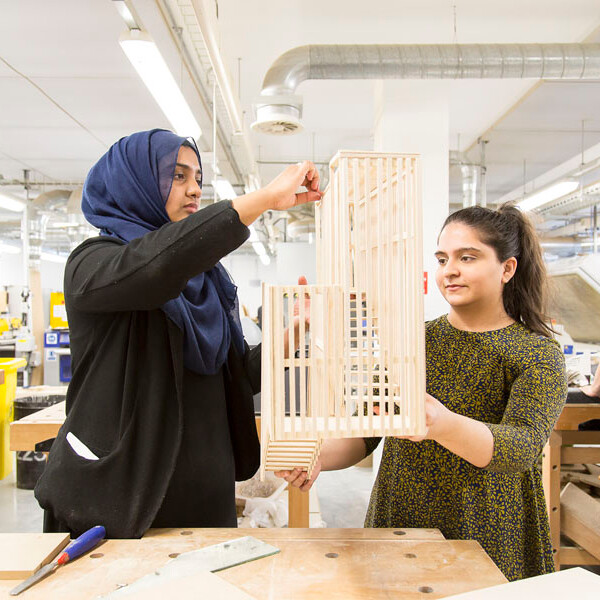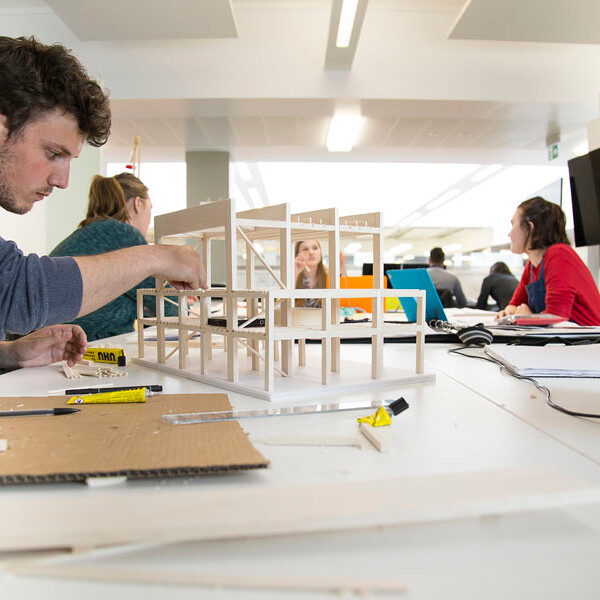
Architectural Practice (RIBA Part 3 Exemption) - PgDip
Currently viewing course to start in 2025/26 Entry. Switch to 2024/25 Entry
Successful completion of the programme gives you recognition for RIBA Part 3, registration with the Architects Registration Board, direct access to title as an architect and therefore gain membership of the Royal Institute of British Architects (RIBA). There are two separate entry and completion points per year, providing a flexible approach to obtaining the final professional qualification....
- Level Postgraduate Taught
- Study mode Part Time
- Award PgDip
- Start date September 2025, February 2026
- Fees View course fees
- Subjects
- Location City Centre
This course is:
Open to International Students
Overview
Successful completion of the programme gives you recognition for RIBA Part 3, registration with the Architects Registration Board, direct access to title as an architect and therefore gain membership of the Royal Institute of British Architects (RIBA).
There are two separate entry and completion points per year, providing a flexible approach to obtaining the final professional qualification. Intensive two-day lecture and workshop sessions are supported by weekend revision and study groups, which allow the programme to be delivered harmoniously alongside your existing work commitments.
What's covered in this course?
Aimed at students engaged in architectural practice, this postgraduate course gives you the skills and knowledge to gain your qualification. It can also form the basis of your ongoing professional architectural development.
You’ll gain a critical understanding of legal requirements, practice management and construction procurement in the architecture industry, and the fundamentals of good architectural practice.
You’ll receive the support of outstanding professional staff whose extensive connections with architectural practices offer you exceptional opportunities. Lectures are delivered in four two-day intensive courses by a number of leading practitioners and experts in their field. They cover the legal framework, clients and building procurement, as well as practice and management.
Based on your own experience in architectural practice, you’ll be required to prepare a case study in two parts, one around a pre-contract issue and one around an issue arising during the construction phase of a contract. You’ll also use records of experience to develop a critical career appraisal.
You’ll be based in our multi-million pound City Centre Campus Parkside Building with access to advanced digital studios for rapid prototyping and digital production, as well as drawing, CAD and digital visual communication skills workshops.
Accredited By
This course is accredited by:
I thought the course was a rich learning experience, every part of it was very useful. I really enjoyed it.
Kalpesh Patel, Graduate.
Why Choose Us?
- We are the only Royal Institute of British Architects-accredited School of Architecture for the Part 3 course in the region.
- The course meets and exceeds the joint criteria set out by the Architects Registration Board (ARB) and RIBA. Its scope corresponds with the guidelines for RIBA validation and ARB prescription.
- The course also meets the requirements of Article 46 of the European Directive on the recognition of Professional Qualifications.
- Birmingham School of Architecture and Design is highly respected and has a rich history of providing education and opportunities. It celebrated its centenary in 2009.
- Many students have degrees from other UK academic institutions for architecture, resulting in a dynamic body of high-calibre students.
- Visiting tutors come from local practice and we involve other high profile practitioners, such as Eminent Architects, visiting professors and world-renowned consultants.
- Two-thirds of the impact of our research was judged to be very considerable (3*) or outstanding (4*) - REF2021
Choose your modules and study via CPD
Selected modules on this course are available through Continuing Professional Development (CPD). This route allows you to select individual modules around your area of interest and study alongside current students.
Similar Courses
OPEN DAY
Join us for an Open Day where you'll be able to learn about this course in detail, chat to students, explore our campus and tour accommodation. Booking isn't open for this event yet, register your interest and we'll let you know as soon as booking goes live.
Next Event: 28 June 2025
Entry Requirements
Essential requirements
RIBA Part 1 and RIBA Part 2 or an equivalent qualification that the ARB has formally recognised. In certain circumstances this might include working towards a recognised ARB qualification subject to qualifications and experience.
At the final examination, candidates must have gained a minimum of 24 months’ practical experience, 12 months of which must be within the two years preceding the final Part 3 interview.
Entry to the final examination is based on advice by the Course Director that the candidate has sufficient and adequate experience of project management in excess of 24 months, all of which should have been recorded on the Professional Education and Development Resource (PEDR).
All non-UK students will be required to take the Birmingham City University English Language Diagnostic Assessment on arrival at the University.
Applying with international qualifications
See below for further information on applying as an international student.
If you have a qualification that is not listed, please contact us.
Fees & How to Apply
UK students
Annual and modular tuition fees shown are applicable to the first year of study. The University reserves the right to increase fees for subsequent years of study in line with increases in inflation (capped at 5%) or to reflect changes in Government funding policies or changes agreed by Parliament. View fees for continuing students.
Award: PgDip
Starting: Sep 2025
- Mode
- Duration
- Fees
- Part Time
- 10 to 24 months
- £3,140 in 2025/26
Award: PgDip
Starting: Feb 2026
- Mode
- Duration
- Fees
- Part Time
- 10 to 24 months
- £3,140 in 2025/26
International students
Annual and modular tuition fees shown are applicable to the first year of study. The University reserves the right to increase fees for subsequent years of study in line with increases in inflation (capped at 5%) or to reflect changes in Government funding policies or changes agreed by Parliament. View fees for continuing students.
Award: PgDip
Starting: Sep 2025
- Mode
- Duration
- Fees
- Part Time
- 10 to 24 months
-
TBC
Award: PgDip
Starting: Feb 2026
- Mode
- Duration
- Fees
- Part Time
- 10 to 24 months
-
TBC
Application deadlines
We advise you to apply early to allow sufficient time for you to prepare to start your studies. Please apply by Friday 18 July for a September start or Friday 9 January for a February start to allow time to arrange accommodation, student finance and visas where required.
Late applications will be accepted where places are still available, but please note that Welcome Week for September entry begins on Monday 15 September 2025, and teaching begins on Monday 22 September 2025. International students are invited to arrive from Monday 8 September 2025.
To find out more, see our application timeline.
Your portfolio will form the basis of the interview discussion and should include the following:
- Examples of the range of projects that you have been involved with in practice sufficient to demonstrate the breadth of you experience to date.
- Examples of the potential projects that could form the basis of the Case Study, including the programme and details of your personal involvement.
- Evidence of a minimum of 18 months relevant practical experience in accordance with the ARB/ RIBA guidelines prior to starting the programme.
- Evidence of previous academic achievements in higher education including exemption RIBA Parts 1 and 2.
Personal statement
You’ll need to submit a personal statement as part of your application for this course. This will need to highlight your passion for postgraduate study – and your chosen course – as well as your personal skills and experience, academic success, and any other factors that will support your application for further study.
If you are applying for a stand alone module, please include the title of the module you want to study in your Personal Statement.
Not sure what to include? We’re here to help – take a look at our top tips for writing personal statements and download our free postgraduate personal statement guide for further advice and examples from real students.
Course in Depth
Modules
In order to complete this course you must successfully complete all the following CORE modules (totalling 120 credits):
The purpose of this module is to develop your existing professional attributes and skills gained through work-based experiential learning in the areas of professional legal framework and practice management. This includes critical analysis of the architect’s responsibility to society and the profession, the legal and legislative context for practice and the business and management processes involved in running and developing a successful business.
The purpose of this module is to develop your existing professional attributes and skills gained through work-based experiential learning in the areas of building procurement and contract administration. This includes critical analysis of the architect’s responsibility to society and the profession, the legal and legislative context for practice and the business and management processes involved in running and developing a successful business.
The purpose of this module is to enable you to record and develop your professional experience in practice and to critically reflect on your learning within that context. You will be expected to map your work-based learning to the professional criteria in order to demonstrate your direct experience and to enable you to develop an approach to your future learning needs and career development. As a minimum you are required to record 24 months professional experience, 12 months of which must be recent and post Part 2.
The purpose of this module is to enable you to develop professional judgement and critical analysis gained through your practical experience through a live project case study. The case study will be a current or recent project where you have had a reasonable level of involvement and that has an appropriate level of complexity to facilitate in depth analysis. The case study will provide the vehicle for critical analysis through the investigation of an issue or issues during the pre-contract and construction stages of a project. Your experience and research of these issues should be compared to best practice. You should also make comparisons with other forms of contract in order to reinforce your understanding of the different processes, risks and responsibilities involved in dealing with the issued raised. The case study will cover most of the professional criteria for Part 3 and will bring together the material covered in the academic taught sessions with your practical experience and work-based learning.
Download course specification
Download nowYou’ll be assessed in four parts: Your professional, practical experience is a key part of your studies and helps form the basis of case studies and career appraisal.
Producing an open scenario-based Professional Practice and Management paper will be part of your assessment. Following on from this, you will sit an open book written examination on building procurement and contract administration. The final Viva (professional interview) is embedded within the Professional Experience and Development and Case Study modules.
Reflecting on professional experience and development is an important part of the process, which includes professional experience record sheets - PEDR, CV and critical career evaluation.
You will also evaluate your own experiences in architectural practice through producing a detailed case study.
Lectures are delivered in four, two-day intensive courses by a number of leading practitioners and experts in the field. Modules are preceded by recommended reading and office-based preparation.
The course is studied part-time and completion is flexible over a period between ten months and two years. There are two course entry points and two opportunities to complete the oral examination per year.
This course is accredited by:
Our course is accredited by the Royal Institute of British Architects, allowing you to achieve RIBA Part 3 exemption. This allows you join the ARB’s register of architects and use the title ‘architect’ and optionally to join the RIBA as a full member affording the title ‘chartered architect’.

Royal Institute of British Architects
RIBA is a global member organisation, with 44,000 members. It champions better buildings, communities and the environment and provides the standards, training, support and recognition to put members at the peak of their profession.
Our accreditation shows employers that students graduating from our course have the levels of knowledge and skills they need.
Employability
Enhancing employability skills
The final exam with the award of Postgraduate Diploma in Architectural Practice gives exemption from the RIBA Part III examination and enables you to become a registered architect and chartered member of RIBA.
You’ll have demonstrated the professional and practical skills needed to be a successful architect, with the knowledge of the necessary business frameworks and legal issues.
A sound knowledge of UK construction and contract law, construction procurement processes and the roles of built environment professionals will enhance your professional understanding.
You’ll also be able to demonstrate understanding of the business priorities, required management processes and risks of running an architectural practice.
Facilities & Staff

Our Facilities
When you join Birmingham City University, the first thing you will notice is the exceptional quality of our campuses. With an investment of over £400 million across our buildings and facilities, we are committed to giving you the very best learning environment to help shape your experience.
You will be based in our multi-million pound Parkside building – a state of the art facility located within our City Centre Campus. Here you will have full access to our recently upgraded, high spec CAD (Computer-Aided-Design) workstations situated within our dedicated computer labs and open access areas. We also provide access to leading edge digital design software, enabling you to explore technical drawing, graphics, 3D modelling, visualization, animation, computation, simulation, and virtual reality.
The Parkside Building is also home to our digital fabrication labs, where you will be able to explore 3D printing, laser cutting, CNC machining, ceramics, glass and traditional model-making, guided by our team of expert technicians with access to our on-site material store, and professional printing facilities.
You’ll also benefit from:
- Design studios
- Physical and digital library
- Loanable laptops
- Dedicated social spaces
- Cafés
Photo Gallery
From industry-standard software, to our workshops and studio spaces, everything you need will be at your fingertips from day one. Working with our dedicated teaching teams and expert technicians, you'll be supported from concept through to completion.
Our staff
Ian Shepherd
Associate Professor / Director of Professional Studies / Course Director Postgraduate Diploma in Architectural Practice (Part 3)
Ian has been involved with architectural practice on a professional level since qualifying in 1990. He was a one of the founding partners in Birmingham based D5 Architects LLP where he remained as a consultant until April 2017. In addition to his commitment to architecture and the built environment through the practice, he is also interested in...
More about IanHannah Vowles
Emeritus Professor of Architecture
Hannah studied architecture at Kingston and the Architectural Association. She worked in architectural practice for 10 years, in both the public and private sector. Hannah founded collaborative art practice / project Art in Ruins with artist Glyn Banks making exhibitions, installations, publishing critical writing, curating and teaching.
More about Hannah










